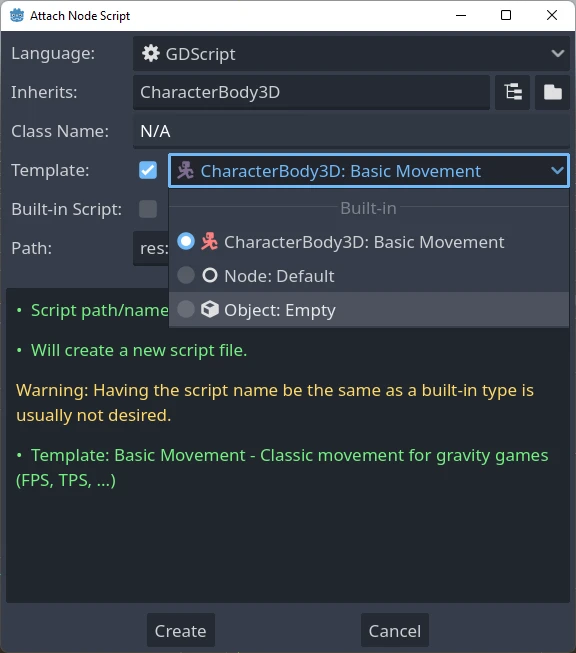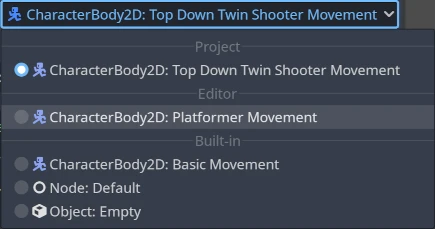Up to date
This page is up to date for Godot 4.2.
If you still find outdated information, please open an issue.
Criando modelos de script¶
O Godot fornece uma maneira de usar modelos de scripts, como visto em Script Create Dialog enquanto se cria um novo script:

A set of built-in script templates are provided with the editor, but it is also possible to create new ones and set them by default, both per project and at editor scope.
Templates are linked to a specific node type, so when you create a script you will only see the templates corresponding to that particular node, or one of its parent types. For example, if you are creating a script for a CharacterBody3D, you will only see templates defined for CharacterBody3Ds, Node3Ds or Nodes.
Localizando os modelos¶
Existem dois lugares onde os modelos pode ser manipulados.
Modelos definidos pelo editor¶
Estes estão disponíveis para todos os projetos. A localização destes modelos é determinada por cada SO em particular:
Windows:
%APPDATA%\Godot\script_templates\Linux:
$HOME/.config/godot/script_templates/macOS:
$HOME/Library/Application Support/Godot/script_templates/
Se nenhum "script_templates" for detectado, o Godot irá criar um conjunto de modelos automaticamente, essa mesma lógica pode ser usada para reverter os modelos ao estado original, caso você acidentalmente tenha cometido algum erro.
Modelos definidos pelo projeto¶
O caminho padrão para buscar modelos é o diretório res://script_templates/. O caminho pode ser mudado configurando a opção editor/script_templates_search_path em ProjectSettings, tanto via código quanto pelo editor.
Se nenhum diretório``script_templates`` for encontrado no projeto, então é simplesmente ignorado.
Template organization and naming¶
Both editor and project defined templates are organized in the following way:
template_path/node_type/file.extension
where:
template_pathis one of the 2 locations discussed in the previous two sectionsnode_typeis the node it will apply to (for example, Node, or CharacterBody3D)fileis the custom name you can chose for the template (for example:platformer_movementorsmooth_camera)extension: will indicate which language the template will apply to (it should begdfor GDScript orcsfor C#)
Por exemplo:
template_scripts/Node/smooth_camera.gdtemplate_scripts/CharacterBody3D/platformer_movement.gd
Default behaviour and overriding it¶
By default:
the template's name is the same as the file name (minus the extension, prettyfied)
the description is empty
the space indent is set to 4
the template will not be set as the default for the given node
It is possible to customize this behaviour by adding meta headers at the start of your file, like this:
# meta-name: Platformer movement
# meta-description: Predefined movement for classical platformers
# meta-default: true
# meta-space-indent: 4
// meta-name: Platformer movement
// meta-description: Predefined movement for classical platformers
// meta-default: true
// meta-space-indent: 4
In this case, the name will be set to "Platformer movement", with the given custom description, and it will be set as the default template for the node in which directory it has been saved.
This is an example of utilizing custom templates at editor and project level:

Nota
Os modelos de script têm a mesma extensão que os arquivos de script normais. Isto pode levar a uma questão de um analisador de scripts tratando esses modelos como scripts reais dentro de um projeto. Para evitar isto, certifique-se de ignorar o diretório que os contém, criando um arquivo .gdignore vazio. O diretório não será mais visível em todo o sistema de arquivos do projeto, mas os modelos podem ser modificados por um editor de texto externo a qualquer momento.
Dica
By default, every C# file inside the project directory is included in the compilation. Script templates must be manually excluded from the C# project to avoid build errors. See Exclude files from the build in the Microsoft documentation.
It is possible to create editor-level templates that have the same level as a project-specific templates, and also that have the same name as a built-in one, all will be shown on the new script dialog.
Modelo padrão¶
To override the default template, create a custom template at editor or project level inside a
Node directory (or a more specific type, if only a subtype wants to be overridden) and start
the file with the meta-default: true header.
Only one template can be set as default at the same time for the same node type.
The Default templates for basic Nodes, for both GDScript and C#, are shown here so you can
use these as the base for creating other templates:
# meta-description: Base template for Node with default Godot cycle methods
extends _BASE_
# Called when the node enters the scene tree for the first time.
func _ready() -> void:
pass # Replace with function body.
# Called every frame. 'delta' is the elapsed time since the previous frame.
func _process(delta: float) -> void:
pass
// meta-description: Base template for Node with default Godot cycle methods
using _BINDINGS_NAMESPACE_;
using System;
public partial class _CLASS_ : _BASE_
{
// Called when the node enters the scene tree for the first time.
public override void _Ready()
{
}
// Called every frame. 'delta' is the elapsed time since the previous frame.
public override void _Process(double delta)
{
}
}
The Godot editor provides a set of useful built-in node-specific templates, such as
basic_movement for both CharacterBody2D and
CharacterBody3D and plugin for
EditorPlugin.
Lista de placeholders de modelo¶
O seguinte descreve a lista completa de placeholders de modelo integrados que estão embutidos atualmente.
Placeholders base¶
Placeholder |
Descrição |
|---|---|
|
The name of the Godot namespace (used in C# only). |
|
O nome da nova classe (usado apenas em C#). |
|
O tipo básico de onde um novo script herda. |
|
Indentation placeholder. The exact type and number
of whitespace characters used for indentation is
determined by the |
Placeholders de tipo¶
There used to be, in Godot 3.x, placeholders for GDScript type hints that
would get replaced whenever a template was used to create a new script, such as:
%INT_TYPE%, %STRING_TYPE%, %FLOAT_TYPE% or %VOID_RETURN%.
The placeholders no longer work for Godot 4.x, but if the setting
text_editor/completion/add_type_hints from
EditorSettings is disabled, type hints
for parameters and return types will be automatically removed for a few
base types:
intStringArray[String]floatvoid:=will be transformed into=